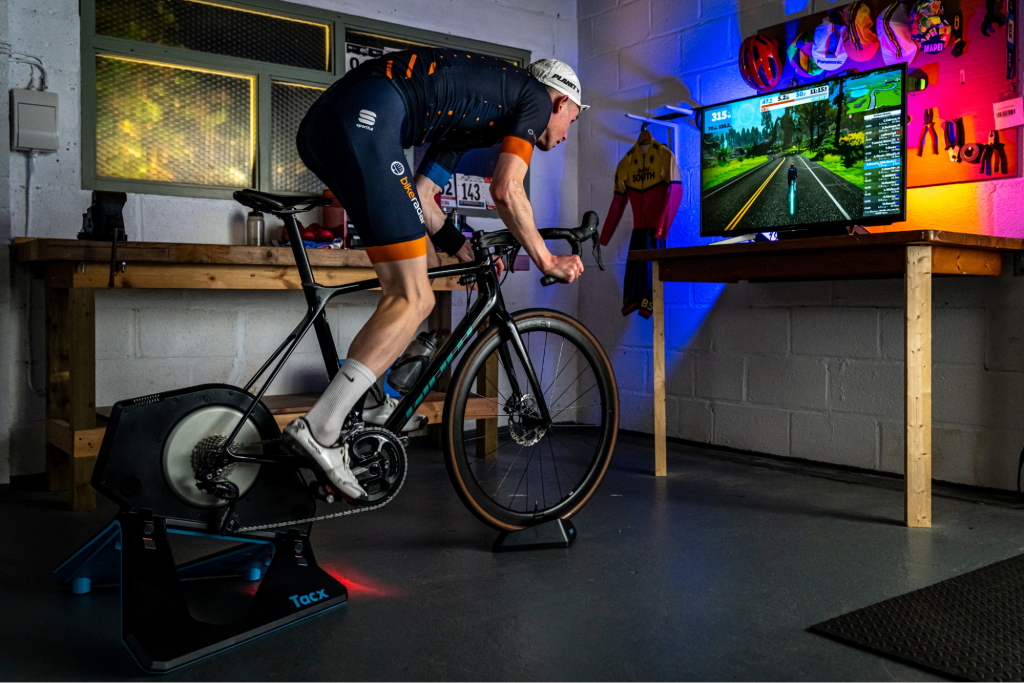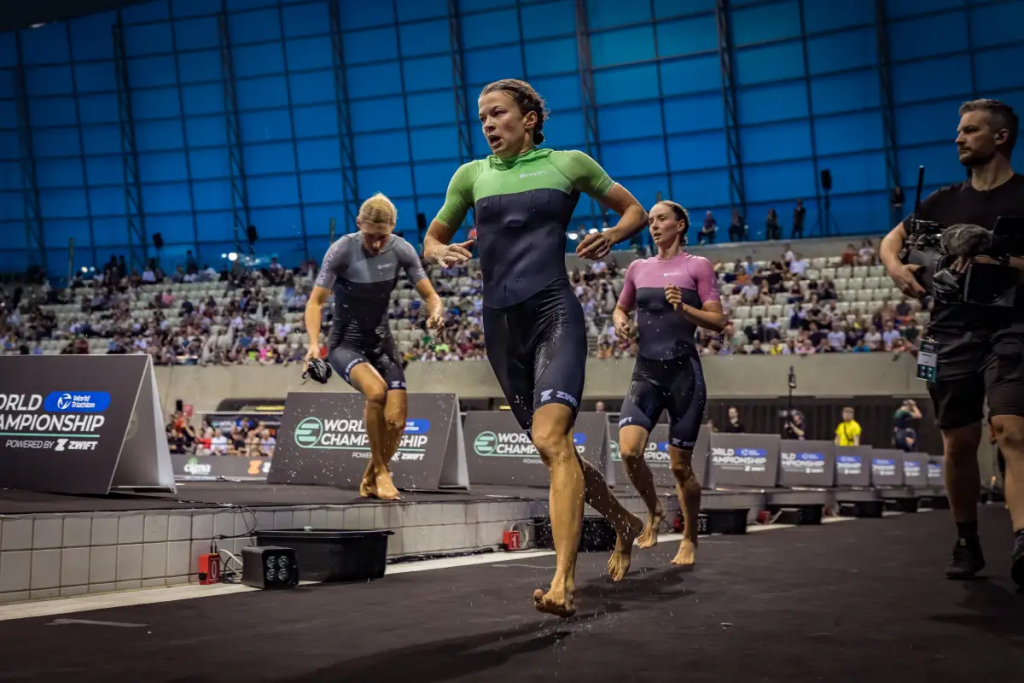In this new blog series, we give the floor to scientists engaged in technology related research and valorization activities within the sports technology and innovation field at Ghent University. In this way we want to provide insight into what is brewing behind the scenes. In short, we put the researcher under the microscope.
In this blog we have a chat with Thibault Fouquaert.
Thibault is a PhD researcher at the Department of Movement and Sport Sciences, more specifically at the Sport Management research group. A recurring topic in his doctorate is Virtual Sports and its place in the sports landscape.
What’s in a name?
Virtual sports are a relatively new concept, so let’s start with a definition:
Virtual sports are mixed reality sports games using interactive peripheral sport equipment. Virtual Sports can best be thought of to extend an existing sport.
“You can take it very far, any sport can have a virtual variant in the future. There doesn’t necessarily have to be Virtual Reality involved or a platform or an app or something. The ‘virtual’ aspect could be physical through the addition of smart equipment, like LED lighting, projections, or holograms. So it’s really a continuum of different axes. On one axis you can ask yourself whether you are going to virtualize your sport into something purely technological or into something more physical, while on another axis it is “to what degree is it a game or a really serious competition?”

Besides Virtual Sports, there are also Exergames and eSports. They are connected, but not equal. Together they form a continuum, with Exergames at one end, eSports at the other, and Virtual Sports in the middle. That is because a virtual sport sometimes leans more toward an exergame, and sometimes more toward an eSport. But there is value in naming it as a separate category: a general consensus on this classification helps avoid confusion in the first place, but it also creates opportunities.
“For example, sport federations or sport governing bodies can be allowed to invest in sports, but not in eSports or competitive gaming. If virtual cycling were to be labeled as eSports, sport organizations might miss opportunities of using virtual cycling for improving sports practices, as its label of ‘eSports’ could hinder funding applications or further consideration in general.”
Thus, a virtual sport can be seen as more than gaming. It is a means to achieve other potentials in and through sports, such as: new ways to practice sporting skills and techniques, new competition formats from leisure to elite level, staying connected through sports via online platforms, and more.
“My research focuses mainly on sports management, on the impact of virtual sports on sports organizations and the sports industry. That’s where we try to see what’s possible, which organizations see what use for it, and which virtual sports are best suited for which purposes.”



Virtualsports.be
“To make the concept more understandable, I created a science communication website: virtualsports.be. I also linked it with a scientific network, the Virtual Sports Research Network, specifically doing research that is in any possible way related to Virtual Sports.”
“So on the one hand it is intended to provide clarity around the concept of Virtual Sports, like a reference point with concrete examples and info about the research, and on the other hand it provides an overview of researchers who have expertise in Virtual Sports. This can be useful when, for example, policy makers need advice.”
The IOC, the International Olympic Committee, has added Virtual Sports as an agenda item to embrace and act on. Virtual Sports can e.g. boost Olympic values by engaging people in sports and using it for social purposes. The IOC is specifically talking about Virtual Sports and not eSports. So they are saying that it has to be a physically active version of an eSport or an Exergame (see recommendation 9 in the Olympic agenda).
Sport Vlaanderen, on the other hand, talks about e-Sports (eSports but with a dash). And by that they also mean physically active eSports, because in terms of policy focus they want to target new virtual variants of sports. So there is still a lot of confusion about the term, which is why Thibault’s website makes an appeal to use the term Virtual Sports. That way everyone is talking about the same thing, and it is also much easier to write out projects, proposals or a policy study.
“The website represents one (of the many) channels to provide some context, and it allows me to go deeper into the research results there than in, say, a social mediapost. But I can also use it to give other researchers a forum. Now it’s mostly academically oriented, but I think in the future it will be interesting to open that up to people who are more in the field. Like, for example, the people from HOWEST who are going to effectively develop the technological intertwining between sports and virtual sports with their students. They could give feedback on what they learned from that, in what sports, what technology, what audiences…”
“Communicating remains a difficult balancing act because you have a somewhat limited target audience, and yet you have to try to communicate that as broadly as possible. That’s not an easy task. Communicating very broadly without sacrificing depth.”

How to create a new virtual sport
“In one of the studies I’m working on, I’m looking into how national and international cycling and triathlon federations adopt and legitimize a virtual discipline within their organization. Like, for example, how the UCI came to make virtual cycling a separate discipline within cycling and how they manage to put it on par with other traditional disciplines.”
“Imagine the IOC offering some virtual variants for LA 2028: it would be perfect if we’d be able to support them with the research we are doing. Virtual sports offer a lot of opportunities there. You could provide opportunities such as new competition formats for athletes or even create a level playing field for para-athletes because the technological intertwining of virtual sports could allow for that type of customisation within a sporting competition. You could also add a competition layer to get people involved in a sport, or make it appealing to new audiences. Our research is about all the opportunities that virtual sports have to offer and how those opportunities are perceived and managed by sports organizations.”
“Virtual cycling is currently one of the few technologies that developed from being used by individual consumers to sporting organizations and it becoming an institutionalized sporting discipline. If it can succeed in one sport, our research can learn from that and help international or national federations of other sports to successfully incorporate virtual sports.”
“Suppose you want to make rowing into a virtual format and set up a virtual rowing competition. Then what are the lessons learned from other federations, what are the best practices, how do you deal with that? Do you have other opportunities to extend your sport to clubs, to people who have not yet come into contact with rowing or find traditional rowing not that exciting? The technology and platforms are already there, so what are we waiting for?”
“So if there is support from federations, both national and international, but also from Sport Vlaanderen and other agencies, I think it would be nice if in the future we can collaborate on such projects in other sports, based on what we have learned in virtual cycling. Our upcoming research results will certainly be able to help support that.”
Still a lot of untapped potential
“Despite it being a working point of the IOC, we haven’t seen much of Virtual Sports yet these Olympics. At the previous Olympics, they did have an Olympic Virtual Series, where, amongst many different sports, one could (virtually) cycle and compete along the exact course of the Olympics, with the same landscape and gradient and so on. The same goes for rowing and sailing, where you could race against your global nautical community.”

“What might also catch on to get people more involved: if there were organizations that run virtual cycling sessions where you can ride with the pros as a recreational athlete. Or something I also haven’t seen yet but which also strikes me as an opportunity, is that you could give Parasports a larger forum by partially removing the limitations of athletes by tuning that virtual addition in such a way that they get a certain advantage or a certain disadvantage relative to each other, enabled by the technology behind it. Both in people who don’t have disabilities, or between people who have.”
“But well, those are altruistic projects. In practice you do see some first virtual sports events, but these are focused on gathering spectators. If they were to open that up even more: I think that that would be a great valorization for the future. There are still a lot of opportunities that aren’t being exploited yet. You see some try-outs here and there, but not yet on a large scale. An integrated approach, in which you can interweave all the opportunities, is something I haven’t seen yet but definitely a direction to support with our research.”
Valorizations to keep an eye on
“In triathlon, for example, there is SuperTri. SuperTri is an organizer of competitions where they have adapted the triathlon format to a virtual variant, called SuperTri E. The competition takes place in a swimming stadium and starts with swimming in the pool, then the athletes cycle on rollers (smart trainers) with Zwift, and then they run on the treadmill.”
“For spectators, those competitions are much more dynamic. A full distance triathlon lasts 7-8 hours, so if you want to watch it on TV, I think a lot of people will occasionally switch channels. Or if you’re standing on the side of the road, you see them pass by once and then they’re gone again. While at a SuperTri triathlon you can stay in the stadium and you really have quite some spectacle there. I think it’s really admirable and innovative how this organization managed to bring together federations, sponsors and athletes to organize something completely new in sports.”


If you want to learn more about Virtual Sports or if you are interested in becoming a Virtual Sports Network member, make sure to visit https://www.virtualsports.be/. Or contact Thibault directly: thibault.fouquaert@ugent.be.

